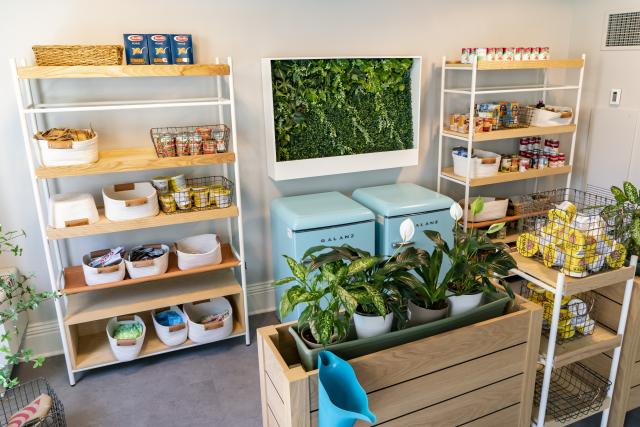
Campus Cupboard
- Home
- Campus Life
- Support Services
- Wellness Lodge
- Campus Cupboard
D’Youville’s Campus Cupboard is a campus-wide effort to ensure that no student experiences food insecurity.
Food insecurity is when someone has limited or uncertain access to nutritionally adequate and safe foods. The Campus Cupboard offers a variety of non-perishable, frozen, and fresh foods, as well as personal care items.

Located in Koessler Administration Building (KAB) 300, the Campus Cupboard is open to all students as a "grab and go" service, no financial proof or paperwork required.
If you or someone you know is in need of food assistance but is uncomfortable seeking help through the Campus Cupboard, you may contact the Wellness Lodge to arrange for more discrete assistance.
Snap Eligibility
Did you know that you could be eligible for SNAP benefits? Students are eligible for SNAP if they:
- Work at least 20 hours/ week
- Participate in a state or federal work study program
- Take care of a child under 6 years old
- Are a single parent who takes care of a child under 12 years old
- Take care of a child between 6-12 years old and do not have adequate child care to enable them to attend school, and work a minimum of 20 hours/ week or take part in a state/ federal work study program
- Get public assistance benefits under a Title IV-A program of the Social Security Act
You can apply for SNAP online or you can call Food For All at 716-882-7705 for assistance with your SNAP application or to check your eligibility.
Food Farmacy
Part of FeedMore WNY, this food pantry is in partnership with Catholic Health and D’Youville University and students are eligible to register. Food is selected based on an individual's dietary needs by a FeedMore WNY dietitian.
Learn more by visiting their website.
Donate
Campus Cupboard accepts all donations of non-expired food items and personal care items, as well as monetary donations. Donations can be brought to the Campus Cupboard (KAB 300)
Suggested Items to Donate
- Tuna
- Pasta
- Rice
- Fresh fruits/vegetables
- Frozen foods
- Granola bars
- Canned Sauce
- Canned Soups
- Crackers
- Peanut butter
- Laundry detergent
- Feminine Care Items
- Shampoo/conditioner
- Body wash
- Toilet paper
- School stationery
- Cereal
About Food Insecurity
About Food Insecurity
Over 12% of the U.S. population (15.6 million people) were food insecure in 2016, and students in WNY are more than twice as likely to be food insecure than the national average.
According to the Feeding America organization, a network of emergency food shortage agencies, nearly one third of those they serve had to choose between paying for food and covering educational expenses in 2014. And that need extends to our campus.
Main navigation
Campus Life
Wellness Lodge Contact
Jessica Bosch, MSW
Project Director for Wellness Education
boschj@dyu.edu
Shavon Eason, BSW
Campus Advocate
easons@dyu.edu
Third Floor 300 & 301 Hours: Monday - Friday
8:30 AM - 5:00 PM